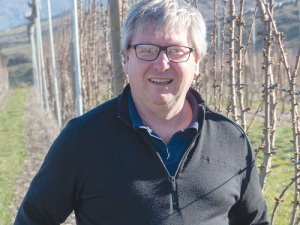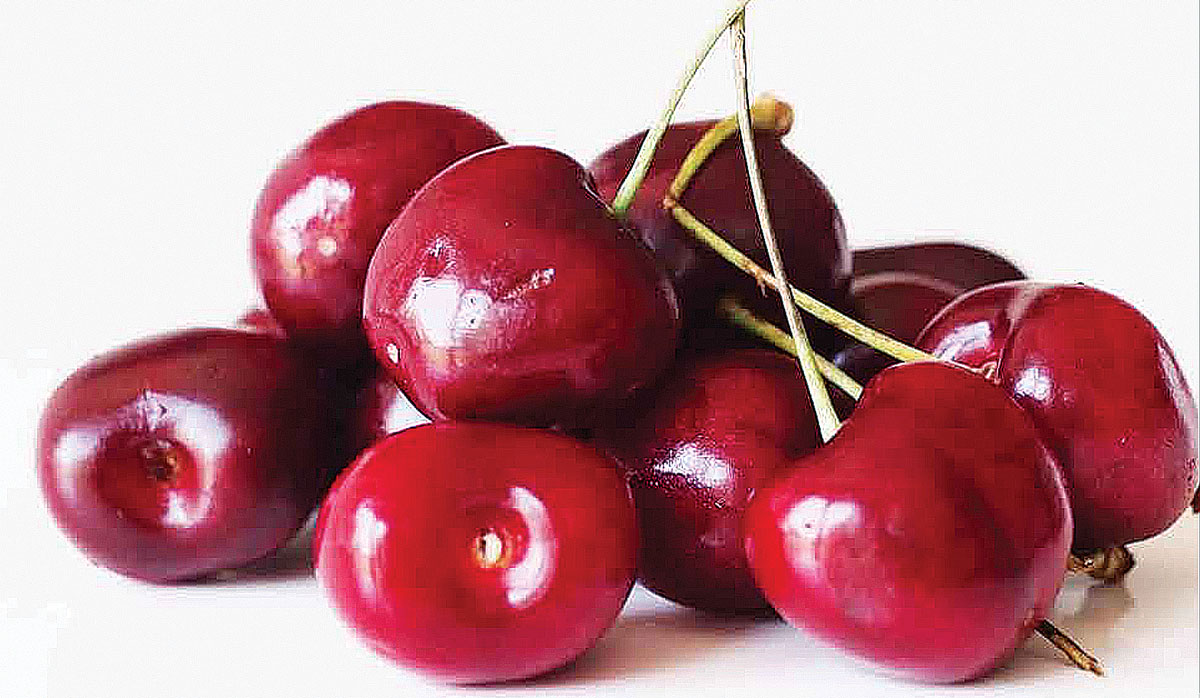Cherry on top – exports reach record levels
New Zealand cherry exports may be headed for a record year in terms of volume, says Summerfruit NZ chief executive Dean Smith.
 Tim Jones says they usually start picking cherries in mid-to-late December, but this year expect to begin in early December.
Tim Jones says they usually start picking cherries in mid-to-late December, but this year expect to begin in early December.
This year's Central Otago cherry picking season looks like being about a week earlier than usual.
Tim Jones, chief executive of Cromwell-based cherry orchardists 45 South, told Hort News - near the end of October - the fruit is at chuck fall stage with small green fruit appearing. He says that a warm spell in July "kicked things off and then it's just been slightly warmer all the way through".
Jones added that there had been some quite unsettled weather over spring with a lot of wind, a bit more rain than normal over bloom, and the odd frost - but also some nice warm weather for pollination.
"At the moment it's a little bit unknown but it looks like it's okay."
Expecting 2,200 tons of fruit this year, 45 South is primarily exporting but with "a strong relationship" with Foodstuffs for its pre-Christmas trade.
Jones says they normally start picking around the December 10 to 15 but are expecting to start around December 5 at this stage.
Central Otago Fruitgrowers Association chair Kris Robb says it was early days but everyone is through flowering and pollination.
"The early fruit is set now and I think the general consensus around the area is there is a bit of optimism now about the crop," he told Hort News.
Robb is general manager at Clyde Orchards, Earnscleugh, which is unique in having a large cherry orchard under cover in plastic-covered green houses. The Canadian-sourced Cravo brand greenhouses, normally used for animals like vegetables and berries, feature retractable roofs for greater control over climate and watering.
Robb says getting the best out of the system has been a learning curve but they are expecting to start picking about four weeks earlier than outdoor cherries.
He adds that fruit quality is also markedly improved with a pack-out rate of up to 90% fruit suitable for export. That compares with about 65% for conventional outdoor cherries.
"Our pack-out profiles are lifting, with minimal waste."
 |
|---|
|
|
Labour Shortage Over?
The seasonal labour shortages of the Covid years look to be over, judging by the interest expressed to 45 South.
Jones says the orchard employs about 550 people but has had over 7000 people apply.
He says there had been a great response both from young Kiwis of school and university age, as well as from holiday backpackers.
“There looks to be a really good volume of those guys in the country,” he told Hort News. “At this stage there is no shortage. Of course, they’ve all got to turn up but we’re feeling a lot more comfortable than we have for the last few years.”
Meanwhile, the Central Otago District Council has for the second year re-launched an initiative aimed at attracting seasonal workers into the district.
Aimed chiefly at both horticulture and tourism, the “Central Mahi” scheme invites prospective employers to “sell” themselves by way of short promotional videos hosted on the council website.
“We are hoping for a high level of engagement again this year,” CODC Economic Development Manager Nick Lanham says.
“Last year’s campaign had over 5000 people engage with it online, in addition to those in person on campuses and job expos in the lower South Island.”
Lanham told Hort News that about 18 employers took part last year and around 15 had already signed up this year.
“The last two years through Covid have been extremely tough for employers and really hard to find staff, especially for seasonal work. That is improving now that the borders are open.”
Budou are being picked now in Bridge Pā, the most intense and exciting time of the year for the Greencollar team – and the harvest of the finest eating grapes is weeks earlier than expected.
The Real Estate Institute of New Zealand (REINZ) has released its latest rural property report, providing a detailed view of New Zealand’s rural real estate market for the 12 months ending December 2025.
Rural retailer Farmlands has released it's latest round of half-year results, labeling it as evidence that its five-year strategy is delivering on financial performance and better value for members.
OPINION: "We are back to where we were a year ago," according to a leading banking analyst in the UK, referring to US president Donald Trump's latest imposition of a global 10% tariff on all exports into the US.
DairyNZ says the Government’s proposed Resource Management Act reform needs further work to ensure it delivers on its intent.
Overseas Trade Minister Todd McClay says he's working constructively with the Labour Party in the hope they will endorse the free trade agreement (FTA) with India when the agreement comes before Parliament for ratification.

OPINION: A mate of yours truly reckons rural Manawatu families are the latest to suffer under what he calls the…
OPINION: If old Winston Peters thinks building trade relations with new nations, such as India, isn't a necessary investment in…